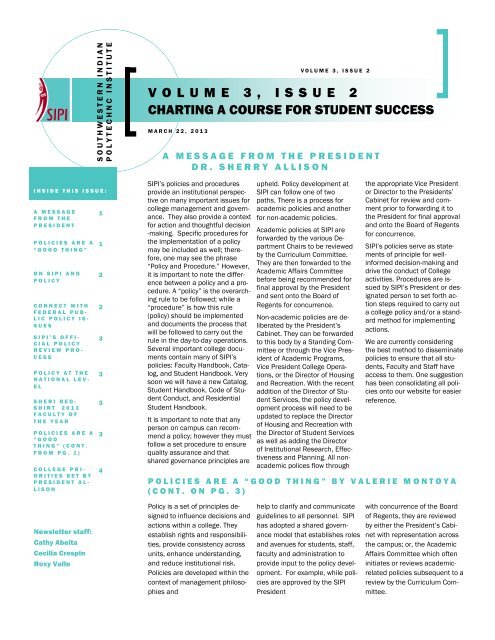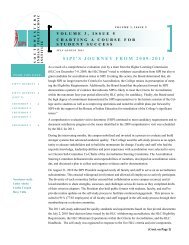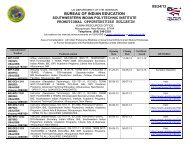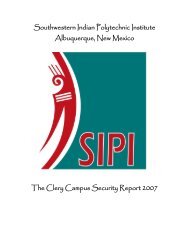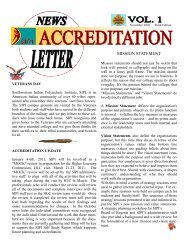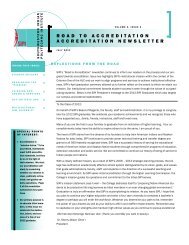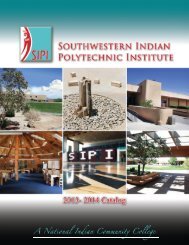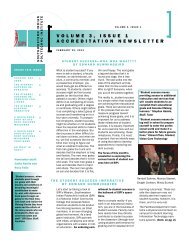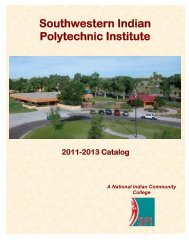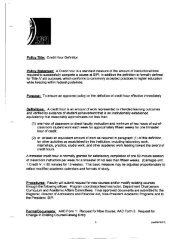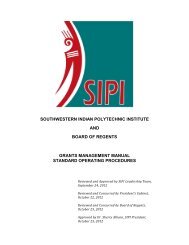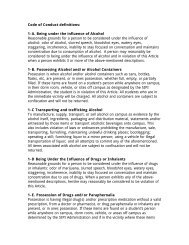volume 3, issue 2 charting a course for student success
volume 3, issue 2 charting a course for student success
volume 3, issue 2 charting a course for student success
You also want an ePaper? Increase the reach of your titles
YUMPU automatically turns print PDFs into web optimized ePapers that Google loves.
S O U T H W E S T E R N I N D I A N<br />
P O L Y T E C H N C I N S T I T U T E<br />
V O L U M E 3 , I S S U E 2<br />
V O L U M E 3 , I S S U E 2<br />
CHARTING A COURSE FOR STUDENT SUCCESS<br />
M A R C H 2 2 , 2 0 1 3<br />
A M E S S A G E F R O M T H E P R E S I D E N T<br />
D R . S H E R R Y A L L I S O N<br />
I N S I D E T H I S I S S U E :<br />
A M E S S A G E<br />
F R O M T H E<br />
P R E S I D E N T<br />
P O L I C I E S A R E A<br />
“ G O O D T H I N G ”<br />
O N S I P I A N D<br />
P O L I C Y<br />
C O N N E C T W I T H<br />
F E D E R A L P U B-<br />
L I C P O L I C Y I S -<br />
S U E S<br />
S I P I ’ S O F F I-<br />
C I A L P O L I C Y<br />
R E V I E W P R O -<br />
C E S S<br />
P O L I C Y A T T H E<br />
N A T I O N A L L E V -<br />
EL<br />
S H E R I R E D -<br />
S H I R T 2 0 1 3<br />
F A C U L T Y O F<br />
T H E Y E A R<br />
P O L I C I E S A R E A<br />
“ G O O D<br />
T H I N G ” ( C O N T .<br />
F R O M P G . 1 )<br />
C O L L E G E P R I-<br />
O R I T I E S S E T B Y<br />
P R E S I D E N T A L -<br />
L I S O N<br />
Newsletter staff:<br />
Cathy Abeita<br />
Cecilia Crespin<br />
Roxy Vallo<br />
1<br />
1<br />
2<br />
2<br />
3<br />
3<br />
3<br />
3<br />
4<br />
SIPI’s policies and procedures<br />
provide an institutional perspective<br />
on many important <strong>issue</strong>s <strong>for</strong><br />
college management and governance.<br />
They also provide a context<br />
<strong>for</strong> action and thoughtful decision<br />
-making. Specific procedures <strong>for</strong><br />
the implementation of a policy<br />
may be included as well; there<strong>for</strong>e,<br />
one may see the phrase<br />
“Policy and Procedure.” However,<br />
it is important to note the difference<br />
between a policy and a procedure.<br />
A “policy” is the overarching<br />
rule to be followed; while a<br />
“procedure” is how this rule<br />
(policy) should be implemented<br />
and documents the process that<br />
will be followed to carry out the<br />
rule in the day-to-day operations.<br />
Several important college documents<br />
contain many of SIPI’s<br />
policies: Faculty Handbook, Catalog,<br />
and Student Handbook. Very<br />
soon we will have a new Catalog,<br />
Student Handbook, Code of Student<br />
Conduct, and Residential<br />
Student Handbook.<br />
It is important to note that any<br />
person on campus can recommend<br />
a policy; however they must<br />
follow a set procedure to ensure<br />
quality assurance and that<br />
shared governance principles are<br />
upheld. Policy development at<br />
SIPI can follow one of two<br />
paths. There is a process <strong>for</strong><br />
academic policies and another<br />
<strong>for</strong> non-academic policies.<br />
Academic policies at SIPI are<br />
<strong>for</strong>warded by the various Department<br />
Chairs to be reviewed<br />
by the Curriculum Committee.<br />
They are then <strong>for</strong>warded to the<br />
Academic Affairs Committee<br />
be<strong>for</strong>e being recommended <strong>for</strong><br />
final approval by the President<br />
and sent onto the Board of<br />
Regents <strong>for</strong> concurrence.<br />
Non-academic policies are deliberated<br />
by the President’s<br />
Cabinet. They can be <strong>for</strong>warded<br />
to this body by a Standing Committee<br />
or through the Vice President<br />
of Academic Programs,<br />
Vice President College Operations,<br />
or the Director of Housing<br />
and Recreation. With the recent<br />
addition of the Director of Student<br />
Services, the policy development<br />
process will need to be<br />
updated to replace the Director<br />
of Housing and Recreation with<br />
the Director of Student Services<br />
as well as adding the Director<br />
of Institutional Research, Effectiveness<br />
and Planning. All nonacademic<br />
polices flow through<br />
the appropriate Vice President<br />
or Director to the Presidents’<br />
Cabinet <strong>for</strong> review and comment<br />
prior to <strong>for</strong>warding it to<br />
the President <strong>for</strong> final approval<br />
and onto the Board of Regents<br />
<strong>for</strong> concurrence.<br />
SIPI’s policies serve as statements<br />
of principle <strong>for</strong> wellin<strong>for</strong>med<br />
decision-making and<br />
drive the conduct of College<br />
activities. Procedures are <strong>issue</strong>d<br />
by SIPI’s President or designated<br />
person to set <strong>for</strong>th action<br />
steps required to carry out<br />
a college policy and/or a standard<br />
method <strong>for</strong> implementing<br />
actions.<br />
We are currently considering<br />
the best method to disseminate<br />
policies to ensure that all <strong>student</strong>s,<br />
Faculty and Staff have<br />
access to them. One suggestion<br />
has been consolidating all policies<br />
onto our website <strong>for</strong> easier<br />
reference.<br />
P O L I C I E S A R E A “ G O O D T H I N G ” B Y V A L E R I E M O N T O Y A<br />
( C O N T . O N P G . 3 )<br />
Policy is a set of principles designed<br />
to influence decisions and<br />
actions within a college. They<br />
establish rights and responsibilities,<br />
provide consistency across<br />
units, enhance understanding,<br />
and reduce institutional risk.<br />
Policies are developed within the<br />
context of management philosophies<br />
and<br />
help to clarify and communicate<br />
guidelines to all personnel. SIPI<br />
has adopted a shared governance<br />
model that establishes roles<br />
and avenues <strong>for</strong> <strong>student</strong>s, staff,<br />
faculty and administration to<br />
provide input to the policy development.<br />
For example, while policies<br />
are approved by the SIPI<br />
President<br />
with concurrence of the Board<br />
of Regents, they are reviewed<br />
by either the President’s Cabinet<br />
with representation across<br />
the campus; or, the Academic<br />
Affairs Committee which often<br />
initiates or reviews academicrelated<br />
policies subsequent to a<br />
review by the Curriculum Committee.
V O L U M E 3 , I S S U E 2<br />
Page 2<br />
O N S I P I A N D P O L I C Y<br />
B Y J O L E N E M A N U S<br />
CONNECT WITH FEDERAL<br />
POLICY ISSUES<br />
The procedures <strong>for</strong> creating<br />
policy at SIPI are a recent<br />
renovation that needed to be<br />
addressed as identified by<br />
the college’s most recent<br />
Higher Learning Commission<br />
comprehensive site visit.<br />
Many departments at SIPI<br />
were conducting official business<br />
practices as practices<br />
and not as <strong>for</strong>mal policy.<br />
Since the site visit, SIPI has<br />
been on a fast track toward<br />
implementing updated policies<br />
and procedures amid its<br />
continuing self-study. The<br />
self-study, in which staff and<br />
faculty across the campus<br />
are involved, requires us to<br />
examine the college’s policies<br />
and procedures and<br />
provide analysis on the effectiveness<br />
and efficiency of<br />
policy implementation.<br />
Policy, in the world of educational<br />
business, is necessary<br />
to provide structure <strong>for</strong> standard<br />
operating procedures<br />
which in turn aide SIPI’s decision<br />
making process. The<br />
intent of this newsletter is to<br />
in<strong>for</strong>m on SIPI Policy and to<br />
answer questions such as:<br />
What is policy and why is<br />
it important?<br />
What is the process of<br />
creating policy?<br />
Where can one locate<br />
SIPI Policies?<br />
SIPI is unique in several ways<br />
including the fact that SIPI is<br />
both an institution of higher<br />
education and a government<br />
funded post secondary institution.<br />
While certain policies<br />
have been created by SIPI <strong>for</strong><br />
institutional needs, SIPI also<br />
adheres to federal government<br />
policies.<br />
An example of certain complications<br />
can be found from<br />
being a federal funded college<br />
and part of the Department<br />
of the Interior and the<br />
expectation that we adhere<br />
to government policy within<br />
hiring processes.<br />
While most higher education<br />
institutions follow similar<br />
processes as SIPI, with the<br />
entire process of hiring, an<br />
added layer in hiring <strong>for</strong> SIPI<br />
is the government background<br />
check. SIPI Human<br />
Resources must work<br />
through the Office of Personnel<br />
Management who must<br />
access the FBI fingerprint<br />
database. If there are fingerprint<br />
<strong>issue</strong>s <strong>for</strong> a prospective<br />
employee then there will be a<br />
delay in hiring. Other personnel<br />
policies guide the selection<br />
process as well. General<br />
policies that SIPI, as a federal<br />
institution, abide by also include;<br />
in<strong>for</strong>mation, technology,<br />
safety, equipment, disposal,<br />
travel, procurement, records<br />
management and budget.<br />
Whilst dissemination of “SIPI<br />
Policy Development Status”<br />
may take some time, it is<br />
important to state that SIPI<br />
Leadership does communicate,<br />
to all SIPI faculty, staff,<br />
<strong>student</strong>s, and stakeholders,<br />
policies that have been sanctioned.<br />
Hard copies of Academic<br />
and Non-academic<br />
SIPI Policies can be found in<br />
the President’s Office. Electronic<br />
access of SIPI Policies<br />
is being decided upon. As<br />
with all documents coming to<br />
life through processes here<br />
at SIPI, evaluation of policies<br />
will also be in a cycle of timely<br />
evaluation. With strong<br />
SIPI Leadership, and committed<br />
SIPI employees, the<br />
Southwestern Indian Polytechnic<br />
Institute is rebuilding<br />
and applying policies <strong>for</strong> a<br />
<strong>success</strong>ful work and higher<br />
education environment.<br />
Be connected and be aware<br />
of the national scene at the<br />
American Association of Community<br />
Colleges’ website.<br />
Check out the 2013 Federal<br />
Public Policy Issues at :<br />
http://www.aacc.nche.edu/<br />
newsevents/News/articles/<br />
Pages/01162013_1.aspx<br />
The Pell Grant program<br />
The Higher Education<br />
Act (HEA) Reauthorization<br />
The Work<strong>for</strong>ce Investment<br />
Act (WIA) Reauthorization<br />
The Carl D. Perkins Act<br />
Reauthorization<br />
Domestic Discretional<br />
Spending: Protecting<br />
Federal Investment in<br />
Community Colleges<br />
Voluntary Framework <strong>for</strong><br />
Accountability (VFA)<br />
Student Borrowers<br />
Nursing Education at<br />
Community Colleges<br />
Immigration/The DREAM<br />
Act<br />
Transfer/Articulation<br />
and Federal Policy<br />
Dr. Allison works with Student<br />
Senate and SIPI staff as discussion<br />
continues on revisions<br />
to the Senate Constitution and<br />
“With strong SIPI Leadership,<br />
and committed SIPI<br />
employees, the Southwestern<br />
Indian Polytechnic Institute is<br />
rebuilding and applying<br />
policies <strong>for</strong> a <strong>success</strong>ful work<br />
and higher education<br />
environment.”<br />
Student Leaders from Tribal<br />
Colleges & Universities converge<br />
on the Hill
V O L U M E 3 , I S S U E 2<br />
Page 3<br />
S I P I ’ S O F F I C I A L P O L I C Y R E V I E W<br />
P R O C E S S , A P P R O V E D 1 / 3 1 / 2 0 1 1<br />
J O H N G R I T T S , F E D E R A L S T U D E N T A I D<br />
U . S . D E P A R T M E N T O F E D U C A T I O N &<br />
2 0 1 3 S I P I O U T S T A N D I N G F A C U L T Y<br />
POLICIES BY VALERIE<br />
MONTOYA (CONT.<br />
FROM PG. 1)<br />
Sometimes, when a policy is<br />
derived from laws or regulations,<br />
a review by the Solicitor’s<br />
Office becomes part of<br />
the process to determine the<br />
legal sufficiency of policy<br />
documents. Since a policy is<br />
broad in nature, it is often<br />
necessary to develop procedures<br />
which are more detailed<br />
and describe the actions<br />
required to carry out<br />
and implement a policy once<br />
it is <strong>for</strong>mally adopted. Ultimately,<br />
policies and procedures<br />
are advantageous to<br />
an institution. They are a<br />
“good thing.”<br />
The United States Department<br />
of Education, Federal<br />
Student Aid requires all eligible<br />
institutions to develop<br />
institutional policies and procedures<br />
to administer their<br />
Federal Title IV Programs.<br />
The Title IV programs at SIPI<br />
are the Federal Pell Grant,<br />
the Federal Supplemental<br />
Educational Opportunity<br />
Grant and Federal Work<br />
Study. These policies and<br />
procedures help to ensure<br />
the college is in compliance<br />
with federal regulations. It<br />
takes a great amount of coordination<br />
to balance and comply<br />
with other funding such<br />
as tribal funds, state funds,<br />
private funds such as the<br />
American Indian College<br />
Fund and institutional funds.<br />
If the college does not<br />
properly administer the programs,<br />
it can create a liability<br />
<strong>for</strong> the college and funds<br />
must be repaid.<br />
My role with the Minority<br />
Serving & Under-Resourced<br />
Schools Division, Federal<br />
Student Aid is to proactively<br />
assist the 35 accredited tribal<br />
colleges, the Alaskan Native<br />
Serving institutions and<br />
Hawaiian Serving institutions<br />
to stay in compliance with the<br />
Title IV programs. I am available<br />
to the colleges <strong>for</strong> technical<br />
assistance, audit questions,<br />
programmatic questions,<br />
monitor reports and<br />
data about the colleges. I<br />
reach out to the colleges<br />
when required or requested.<br />
Having worked at a main<br />
stream college <strong>for</strong> 24 years,<br />
a tribal college as well as the<br />
American Indian College<br />
Fund, I have a firsthand<br />
knowledge and working relationship<br />
with the colleges.<br />
It is a role I enjoy and particularly<br />
when this helps<br />
to make sure the eligible<br />
<strong>student</strong>s can obtain their education.<br />
By John Gritts<br />
Ms. Sheri Redshirt is an outstanding<br />
faculty and community member.<br />
She represents what is best<br />
about SIPI, displaying an authentic<br />
spirit of excellence, service<br />
and professionalism, while taking<br />
pride in who she is as a Native<br />
woman. Students report, “She<br />
clearly enjoys teaching, it is reflected<br />
in her enthusiasm and in<br />
her ability to engage us.” She<br />
works with <strong>student</strong>s to acquire<br />
content knowledge, but also<br />
helps them to build their confidence<br />
and the soft skills that are<br />
needed in industry. She is well<br />
respected by <strong>student</strong>s who describe<br />
her as inspiration and a<br />
role model; and as a result many<br />
<strong>student</strong>s will go on to pursue<br />
higher level college degrees. She<br />
believes strongly in service learning<br />
and through her sponsorship<br />
of the New Optical Image Club<br />
she encourages <strong>student</strong>s to volunteer<br />
<strong>for</strong> the Special Olympics<br />
and the Lions Club International.<br />
She instills in her <strong>student</strong>s the<br />
importance of hard work, and<br />
encourages them to tackle skills<br />
they did not think they could master.<br />
She is a member of the Navajo/Diné<br />
nation and comes from<br />
a family of educators; she shares<br />
how important it is to<br />
acknowledge the rich cultural<br />
background our <strong>student</strong>s possess.<br />
She helps <strong>student</strong>s to understand<br />
that they can share this<br />
cultural knowledge with industry.<br />
As a result of this philosophy SIPI<br />
<strong>student</strong>s have entered the Transitions<br />
Inc. Optical Scholarship<br />
competition in 2011 and 2012;<br />
they won with multi-cultural videos<br />
they have created. It is with<br />
extreme pleasure that Ms. Sheri<br />
Redshirt has been selected as<br />
SIPI’s 2013 Faculty Member of<br />
the Year.
S O U T H W E S T E R N I N D I A N<br />
P O L Y T E C H N C I N S T I T U T E<br />
Mailing Address:<br />
P.O. Box 10146; Albuquerque, NM 87184<br />
Street Address:<br />
9169 Coors Blvd NW, Albuquerque, NM 87120<br />
Phone:<br />
800-586-7474<br />
Website:<br />
http://www.sipi.edu<br />
SIPI is located in the heart<br />
of Indian Country, in the<br />
center of New Mexico’s<br />
high-tech corridor. The<br />
College was established by<br />
a consortium of tribes including<br />
the All-Indian Pueblo<br />
Council (19 New Mexico<br />
tribes), the Navajo Nation,<br />
the Jicarilla Apache Nation,<br />
the Mescalero Apache<br />
Tribe, the Southern Ute<br />
Tribes and other southwestern<br />
tribes. On September<br />
16, 1971, SIPI officially<br />
opened its doors <strong>for</strong> classes.<br />
Today, the College as a<br />
federally-operated institution<br />
offers advanced technical<br />
education and a university<br />
transfer degree to<br />
<strong>student</strong>s who are members<br />
of federally recognized<br />
tribes.<br />
Southwestern Indian Polytechnic Institute<br />
A N A T I O N A L I N D I A N C O M M U N I T Y C O L L E G E T H A T P R E P A R E S<br />
N A T I V E A M E R I C A N S T U D E N T S T O B E P R O D U C T I V E L I F E -<br />
L O N G L E A R N E R S , A S T R I B A L M E M B E R S , I N A N E V E R -<br />
C H A N G I N G G L O B A L E N V I R O N M E N T .<br />
C O L L E G E P R I O R I T I E S F O R 2 0 1 3 - 2 0 1 5 S E T B Y P R E S I D E N T A L L I S O N<br />
As a National Indian Community<br />
College, SIPI’s priorities <strong>for</strong> the<br />
next two years (2013-2015) have<br />
been established by the college’s<br />
President. These priorities were<br />
shared with staff and faculty on<br />
March 1, 2013. SIPI will focus<br />
programs, services, and resources<br />
on Student Success, with<br />
a commitment to building a Culture<br />
of Evidence through reflection,<br />
monitoring, assessing, and<br />
improving college per<strong>for</strong>mance.<br />
SIPI is also pleased to announce<br />
a name change of its newsletter<br />
to “Charting a Course <strong>for</strong> Student<br />
Success” reflecting a commitment<br />
to the President’s Strategic<br />
Priorities.<br />
To promote <strong>student</strong> <strong>success</strong><br />
and an effective culture of evidence,<br />
Southwestern Indian<br />
Polytechnic Institute will:<br />
Goal One: Make learner <strong>success</strong><br />
the core work of SIPI.<br />
Goal Two: Develop new programs,<br />
strengthen existing programs,<br />
and recruit <strong>student</strong>s to<br />
respond directly to the current<br />
and projected demographic and<br />
economic trends of Indian<br />
tribes, the state in which they<br />
are located, the nation, and the<br />
world.<br />
Goal Three: Promote the health<br />
and economic vitality of Indian<br />
tribes and communities through<br />
dynamic partnerships, coalitions,<br />
and collaborations.<br />
Goal Four: Expand the use of<br />
instructional technology to enhance<br />
<strong>student</strong> learning.<br />
Goal Five: Make better use of<br />
existing data; create new actionable<br />
in<strong>for</strong>mation and customers<br />
<strong>for</strong> this in<strong>for</strong>mation to<br />
support SIPI’s operational and<br />
strategic planning ef<strong>for</strong>ts.<br />
Goal Six: Provide new and expanded<br />
opportunities <strong>for</strong> faculty<br />
and staff development that<br />
supports an atmosphere of<br />
excellence in academics and<br />
<strong>student</strong> support services.<br />
“What a culture of<br />
evidence does is it<br />
gets us away from<br />
the mindset that<br />
we know what is<br />
best (without<br />
having to collect or<br />
evaluate data),<br />
based on our own<br />
conventional<br />
wisdom or<br />
experience. The<br />
benefit to this is<br />
that it <strong>for</strong>ces us to<br />
rethink how we do<br />
what we do.”


